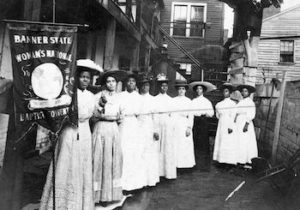
Ballot Support (19th century)
*On this date in 1965, Black women and voting history in America is briefly shared.
Black women in America began to agitate for political rights in the 1830s, creating Female Anti-Slavery Societies in New York and Philadelphia. These interracial groups were radical expressions of women's political ideals, leading directly to voting rights activism before and after the American Civil War. Throughout the 19th century, black women like Harriet Forten Purvis, Mary Ann Shadd Cary, and Frances Ellen Watkins Harper worked on two fronts simultaneously: reminding Black men and white women that Black women needed legal rights, especially the right to vote.
After the Civil War, women's rights activists disagreed about whether to support the ratification of the 15th Amendment, which provided voting rights regardless of race but did not explicitly enfranchise women. The resulting split in the women's movement marginalized Black women, who continued their suffrage activism. The racism that defined the early twentieth century made it so black women were oppressed from every side: first, for their status as women, and then again for their race. Many politically engaged black women were primarily invested in racial equality, with suffrage later becoming a secondary goal.
The Seneca Falls Convention, widely mentioned as the first women’s rights convention, is often considered the precursor to the racial split within the women’s suffrage movement; the Seneca Falls Declaration put forth a political analysis of the condition of upper-class, married women, but did not address the struggles of working-class white women or Black women. Well into the twentieth century, a pattern of segregated political activism emerged, as Black and white women organized separately due to class and racial tensions within the overall movement and a fundamental difference in movement goals and political consciousness.
By the 1890s, the women's suffrage movement had become increasingly racist and exclusionary, and Black women organized separately through local women's clubs and the National Association of Colored Women. Women won the vote in dozens of states in the 1910s, and Black women became a powerful voting wing. The struggle for the vote did not end with the ratification of the Nineteenth Amendment. Its Ratification in 1920 expanded white voting rights substantially but did not address the racial terrorism that prevented Blacks in southern states from voting, regardless of sex.
Black women engaged in multi-pronged activism, as they did not often separate the goal of obtaining the franchise from other goals. Wide-scale racism added to the urgency of their more multi-faceted activism. Most Black women who supported the expansion of the franchise sought to better the lives of Black women alongside Black men and children, which radically set them apart from their white counterparts. While white women were focused on obtaining the franchise, Black women sought the betterment of their communities overall rather than their betterment exclusively as women. In Women, Race and Class, Angela Davis explains that "black women were equal to their men in the oppression they suffered…and they resisted slavery with a passion equal to their men's", highlighting the source of their more holistic activism. Following the Civil War, many black women struggled to keep their interests at the forefront of the political sphere, as many reformers tended to assume in their rhetoric, assuming "black to be male and women to be white."

Women like Fannie Lou Hamer, Ella Baker, and Diane Nash continued the fight for voting rights for all, culminating in the passage of the Voting Rights Act of 1965. In 2018 and 2020, many Black women remember the struggles of segregation, one 67-year-old said. “I was the recipient of that hate and disrespect, and I thought, I have finally outlived it,” she said. “I was wrong.” Since Donald J. Trump’s election, with racial divisions increasingly in public view and voting rights under regular attack, an army of Black women across the South are using networks originally forged in segregation to muster turnout for Democratic candidates in the November elections.